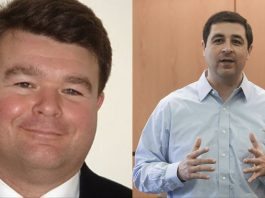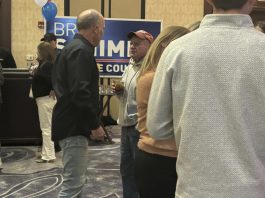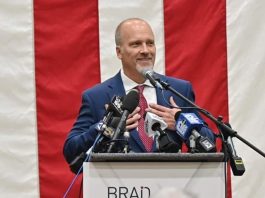Wisconsin Gov. Tony Evers went on television Sunday and lied that the public could have “every single one of those emails” by filing “an open records request and get it.” He was referring to his secret alias email account, warren.spahn@wisconsin.gov.
Why is this a lie? Because Evers’ own office rejected an open records request for the 17,000 records associated with the account on Nov. 22.
Evers also told WISN-TV UPFRONT’s Matt Smith, “I very seldom use it, period.” However, his office admitted to us that there are 17,000 records associated with it. We had asked for all emails sent and received by the account, including attachments, from 2018 to present.
To date, Evers’ office has released zero of the 17,000 records. The state Department of Administration released a handful to WRN through a separate open records request.
The journalist did not challenge Evers on why he was saying the public can file an open records request for all of the emails when his office already rejected an open records request for all of the emails.
“If people want to know what I said in every single one of those emails, they can do an open records request and get it,” Evers proclaimed to journalist Matt Smith.
Here’s his office’s response, rejecting our September request for just that:

Here’s what we asked for:

Here’s Evers on video.
Gov. Evers defends his use of an alias email account and says he's continuing to use a new one: "I think it's a nothing issue. I very seldom use it, period. I occasionally will communicate internally on it if some issue comes up…" pic.twitter.com/1fJr9pOier
— Matt Smith (@mattsmith_news) December 10, 2023
Evers also made other questionable statements about his secret alias account in the name of Warren Spahn, a deceased legendary baseball player. Wisconsin Right Now first revealed the existence of the account in a story. We learned about it from a source associated with state government. Evers’ office has blacked out his secret alias account name.
“It’s legal,” Evers told Smith. However, open government experts have questioned the legality of Evers blacking out the address. Despite that, Evers told Smith that he is using a new alias account; no one knows what it is.
That’s when he said, “If people have, if people want to know what I said in every single one of those emails, they can do an open records request and get it. Nothing would change if we said okay we’re not going to have it anymore. Nothing would change. So I think it’s a nothing issue, and I’m going to continue to say that.”
Evers continued: “I very seldom use it, period. I mean I occasionally will communicate internally on it you know if some issue comes up. And those are open to the public. If people want to do an open records request, they can do it. I don’t how many out-of-state government emails I have sent on that account. I can’t think of any right off the top of my head.”
Wisconsin Right Now has filed a series of new open records requests for the emails.
WRN also received a response to an open records request from Attorney General Josh Kaul on whether he uses an alias email. It turns out that, although Kaul uses two public email accounts, both are variations of his own name (kauljl@doj.state.wi.us and josh.kaul@doj.state.wi.us). Unlike Evers, he did not black out the names and one is available in the public email directory.
No one has come up with another example of a state official using an alias taxpayer-funded email address in a different real person’s name, as Evers did.
By releasing his own email variants to the public, Kaul, the top enforcer of open records laws in the state, made a different legal decision than Evers’ office, which blacked it out.
“It doesn’t surprise me that government officials would have multiple email addresses. Like having multiple phone numbers, distinct email addresses can provide a convenient way to compartmentalize communications for different purposes,” Tom Kamenick, a prominent open records lawyer, told Wisconsin Right Now.
“However, the Open Records Law is not about convenience, it’s about transparency and accountability. Secret email addresses do not benefit the public in any way, they are solely beneficial to their users, so they should not be permitted,” Kamenick said.
“Finally, there’s a distinction between Kaul’s response and Evers’. Kaul indicates that both of those addresses are already publicly available, while Evers claims the right to withhold any email address that isn’t already public.”






![WATCH: Elon Musk Town Hall Rally in Green Bay [FULL Video]](https://www.wisconsinrightnow.com/wp-content/uploads/2022/04/Elon_Musk_3018710552-265x198.jpg)



![The Great American Company [Up Against the Wall]](https://www.wisconsinrightnow.com/wp-content/uploads/2025/03/MixCollage-29-Mar-2025-09-08-PM-4504-265x198.jpg)
![The Wisconsin DOJ’s ‘Unlawful’ Lawman [WRN Voices] josh kaul](https://www.wisconsinrightnow.com/wp-content/uploads/2025/03/MixCollage-29-Mar-2025-08-48-PM-2468-265x198.jpg)